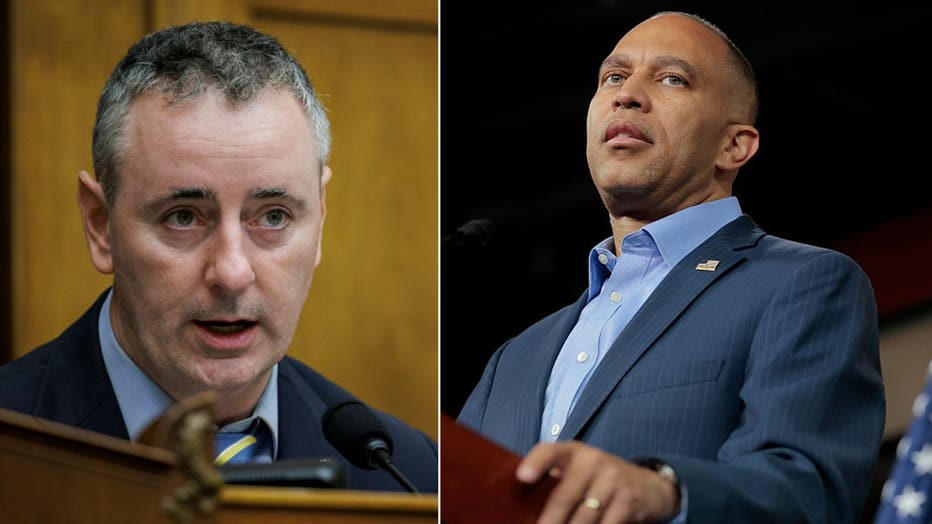'Big, Beautiful Bill': Jeffries stalls Trump megabill; PA GOP Rep. 'no' vote on rules
WASHINGTON - The House appeared to be on its way to advancing President Donald Trump's $3.3 trillion "big, beautiful bill" Wednesday night until it came to a halt thanks to a top Democrat and an unwavering House Republican.
What we know:
House Minority Leader Hakeem Jeffries from New York took to the podium to begin speaking in the House chamber just before 5 a.m. Thursday.
The Democratic leader has been speaking for more than seven hours, with his colleagues continuing to erupt in cheers and standing ovations as he read letter after letter from Americans.
"I never thought that I’d be on the House floor saying that this is a crime scene," Jeffries said. "It’s a crime scene, going after the health, and the safety, and the well-being of the American people."
Speaker Mike Johnson said that House Republicans are "excited" to pass Trump's bill "if Hakeem would stop talking," according to a report by CNN.
"We’re excited to get this done. If Hakeem would stop talking, we’ll get the job done for the American people," Johnson told CNN. "It takes a lot longer to build a lie than to tell the truth, so he’s really spinning a long tale in there, but we’re excited. The people will feel the effect of this bill," he said as Jeffries stretched well into his fourth hour of speaking.
Jeffries' "magic minute" comes after the House voted 219-213 to advance Trump's "big, beautiful bill" to a final vote in Congress.
All Democrats voted no against the procedural vote, along with an initial five Republican holdouts, four of whom were eventually persuaded to support the bill's advancement as Johnson held the vote open into Thursday morning.
Rep. Brian Fitzpatrick from Pennsylvania was the only Republican not to reverse his "no" vote.
Reports say that Fitzpatrick immediately fled the House floor after casting his vote, and has yet to return.

The backstory:
Trump's "big, beautiful bill" would make permanent many of the tax breaks from the president's first term that would otherwise expire by year's end if Congress fails to act, resulting in a potential tax increase on Americans. The bill would temporarily add new tax breaks, including no taxes on tips, and a $6,000 deduction for most older adults earning less than $75,000 a year, and commit $350 billion to national security, including for Trump's mass deportation agenda.
Republicans suffered a series of setbacks after several proposals, including shifting food stamp costs from the federal government to the states or gutting the funding structure of the Consumer Financial Protection Bureau, were deemed out of compliance with the rules.
But over the past days, Republicans have quickly revised those proposals and reinstated them.
The final text includes a proposal for cuts to the Medicaid provider tax that had run into parliamentary hurdles and objections from several senators worried about the fate of rural hospitals. The new version extends the start date for those cuts and establishes a $25 billion fund to aid rural hospitals and providers.
Top income-earners would see about a $12,000 tax cut under the House bill, while the package would cost the poorest Americans $1,600, the CBO said.
The Senate included a compromise over the so-called SALT provision, a deduction for state and local taxes that has been a top priority of lawmakers from New York and other high-tax states, but the issue remains unsettled.
The current SALT cap is $10,000 a year, and a handful of Republicans wanted to boost it to $40,000 a year. The final draft includes a $40,000 cap, but limits it for five years. Many Republican senators say that is still too generous, but House Republicans are not fully satisfied either.
The Source: Information from this article is sourced from the U.S. House of Representatives, CNN, the Associated Press and X.

